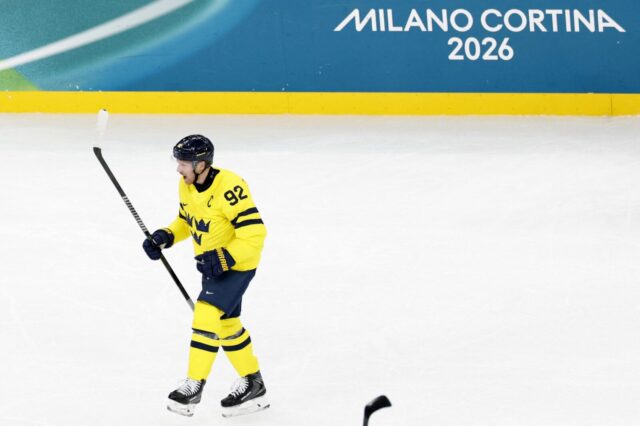Sisu.
No, it’s not just an action film set in Finland during World War II.
Yes, it’s the Finnish term that Eugene Levy explores in the first episode of The Reluctant Traveler.
Maybe it’s something more people could embrace as an ethos. But for now, it’s traditionally Finnish and equally hard to put into words that others can understand.
“It’s a word that doesn’t really have like direct translation,” Finn and forward Artturi Lehkonen told me.
Lehkonen is notably a man of few words when the media is around, so maybe 55 goalscorer Mikko Rantanen’s explanation will make more sense.
“It means a lot of things, but it’s just like mental toughness, working hard. It’s like a Finnish saying. Mental toughness,” No. 96 said. “Just basically means that any adversity or anything, you just fight through it and never complain. You just keep working. Yeah, [like a philosophy].”
Adversity? Fighting through it? Never complaining?
Sounds like what the Colorado Avalanche went through this season. The club had possibly the shortest offseason in NHL history. The team suffered arguably all the injuries in NHL history—twice as many if you ask most fans, however, it was a large but not historic amount. The players fought through the losses, the lack of scoring, the downturns in goaltending, and the meteoric rise from out of the playoffs to Central Division leaders.
And OK, maybe there was SOME complaining. But arguably the Avs just went about their work in a sisu-like way.
“Kind of never [gave] up. We [went] through really tough times with the injuries and the standings. Everybody a little bit kind of was out maybe in January even,” Rantanen said. “There was some hesitation even in our minds, but we found a way. Determination is one good word to describe us.”
Just like how the regular season went, so have the playoffs thus far. First, the squad announced the bad news that team captain Gabriel Landeskog wasn’t going to return for the playoffs. Try as he might to recover from what has become an injury to the cartilage under his patella, Landeskog was unable to get to a pain-free, playable place. Then came the loss of veteran forward, penalty obliterator, and energy guy Andrew Cogliano to an upper-body injury suffered in the penultimate game of the regular season.
After that was the stunning loss to the Seattle Kraken in Game 1 of the Western Conference First Round on home ice at Ball Arena. And next up? How about a pretty stunningly bad first period in Game 2.
“First period was terrible, OK,” Colorado coach Jared Bednar admitted. “I thought that, after going through Game 1, that we would be sharp and really on it in the first, and it’s not like a lack of care or a lack of try. I thought we were tight. We played tight. No one wanted the puck. No one wanted to skate with the puck. We saw parts of that in Game 1. So to me, that was the worst period we’ve played in the series so far.”
Surprisingly, given what we’d all witnessed in the first 20 minutes of that match, the Avs turned it around, scored two goals in 48 seconds, and managed to hold on in a 2-2 nail-biter until midway through the third period when they turned the game around and made it a 1-1 series.
How’d they do it? By going back to the basics.
“You go down in the first period, you’re not winning the game in one shift, OK. We have to build our game back, and so for me, that was part of the message after period one. Like if we want to get our swagger back, we got to start doing the right things. And part of that was we needed to get a little more physical and get engaged,” said Bednar. “We knew we hadn’t played our best hockey at all or anywhere even close in the first [20] minutes, and part of that is with some of the things [Seattle is] doing, and a lot of it is on us.
“So breaking the game down and just trying to string a couple of shifts together. If it goes off track then start fresh again, and that’s what we talked about and guys did a good job of it. We talked about it on the bench during the second period, and actually as the game went on as well.”
Adversity? Check. Hard work? Yes. Determination? You betcha. Overcoming all of that with a workman-like mentality and attitude, free from complaint? You bet your sisu.
“I think the mentality is really strong in this team, and it comes from the coaching staff, from the front office. We push to be better always,” Rantanen said of the team embodying that uniquely Finnish philosophy. “Obviously, we as players, we want to push too. We don’t want to get satisfied because that’s the worst thing you could do, get satisfied and kind of just say ‘it’s going to be easy for us’, but it won’t be. And we know that. So that again tells the mentality of the team and the strength we have.”
One of the guys involved in leading Thursday night’s epic comeback? Lehkonen, that tenacious Finnish forward.
“Lehky is probably the main picture of that,” Rantanen said during our sisu chat back at the end of March. “I think Finnish people, most of them are like that, and it doesn’t matter where you work. Usually, Finnish people come with a good work ethic. Look at the NHL players we have. Most of them have a really, really good work ethic.”
Sisu.
It may be a Finnish word, but it applies to more than just Finns.
However, when you ask Lehkonen—a man whose first-ever concert was AC/DC—what it means for Rantanen to call him the representative of sisu, he demurs.
“I think all the Finns have it.”
Still, the Avalanche will need plenty of the sisu-mindset to make it through this year’s grueling postseason in their quest for back-to-back championships.
*Sisu: “stoic determination, tenacity of purpose, grit, bravery, resilience, and hardiness…”



